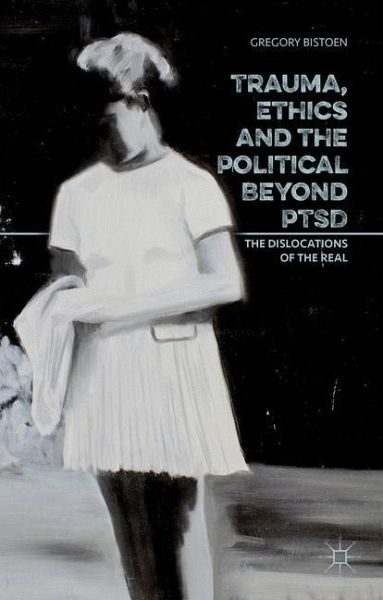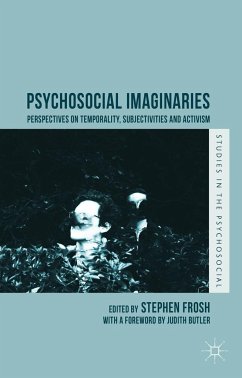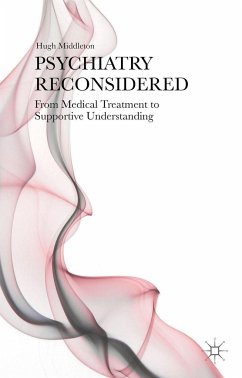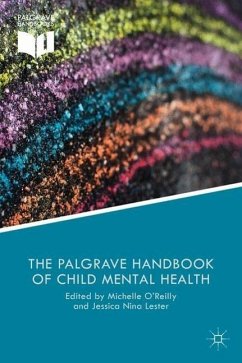
Versandkostenfrei!
Versandfertig in 6-10 Tagen
Weitere Ausgaben:

PAYBACK Punkte
34 °P sammeln!





The contemporary psychiatric approach to trauma, encapsulated in the diagnostic category of PTSD, has been criticized for its neglect of the political dimensions involved in the etiology and treatment of trauma. By means of a philosophical and psychoanalytical analysis, the depoliticizing potential of the biomedical approach is tied to a more general 'ethical crisis' in post-traditional societies. Via the work of Lacan, Zizek and Badiou on the act and the event, this book constructs a conceptual framework that revives the ethical and political dimensions of trauma recovery.
Gregory Bistoen is a Doctoral Researcher at the Department of Psychoanalysis and Clinical Consulting at Ghent University, Belgium, and a Clinical Psychologist and Psychoanalyst in Private Practice.
Produktdetails
- Verlag: Palgrave Macmillan / Palgrave Macmillan UK / Springer Palgrave Macmillan
- Artikelnr. des Verlages: 978-1-137-50084-7
- 1st ed. 2016
- Seitenzahl: 208
- Erscheinungstermin: 3. Februar 2016
- Englisch
- Abmessung: 222mm x 145mm x 16mm
- Gewicht: 355g
- ISBN-13: 9781137500847
- ISBN-10: 1137500840
- Artikelnr.: 44373664
Herstellerkennzeichnung
Springer-Verlag GmbH
Tiergartenstr. 17
69121 Heidelberg
ProductSafety@springernature.com
Derek Hook, Birkbeck
Originality and existing work
As the author makes clear, there have been multiple critiques of the notion of trauma (or PTSD) since the 1980's, and hence a key challenge of the book is to avoid supplying a 'laundry-list' of existing critiques without adding something new. As it stands, the proposed book definitely does add something new, i.e. a more philosophical-political analysis and critique of notions of trauma via the work of Alain Badiou and that of related thinkers. The author will be aware of the work of Ian Parker and the long critical psychology tradition of work that complains of the split between social and subjective, of de-contextualization and de-politicization in the domain of the
Originality and existing work
As the author makes clear, there have been multiple critiques of the notion of trauma (or PTSD) since the 1980's, and hence a key challenge of the book is to avoid supplying a 'laundry-list' of existing critiques without adding something new. As it stands, the proposed book definitely does add something new, i.e. a more philosophical-political analysis and critique of notions of trauma via the work of Alain Badiou and that of related thinkers. The author will be aware of the work of Ian Parker and the long critical psychology tradition of work that complains of the split between social and subjective, of de-contextualization and de-politicization in the domain of the
Mehr anzeigen
psychical. These are of course important critical themes, although they have often been revisited, and not always with satisfying or adequately original responses. I would encourage the author at each point in the development of the manuscript to keep this tradition in mind, and to keep asking themselves how they might make a distinctive and different contribution to these issues via an innovative Lacan and Badiou influenced critique.
Title and readership
A quick observation regards the title: a first glance makes one think that the book is focussed fundamentally on the concept of 'the real' (much like Tom Eyers's recent Palgrave title on the Lacanian real, a title worth referring to in the text itself). If PSTD is the real substantive focus throughout, it would help if this was signalled in the book's main title not just its subtitle. This in turn has a knock-on effect on marketing: if the book is intended for chiefly Lacanian scholars, then the given title works just fine, but if it aims to appeal also to clinicians and a psychology audience interested in PTSD, then perhaps trauma should be centralized more clearly in the title.
The author makes it clear in the 'key selling points' section that PTSD is the book's key signifier when it comes to marketing and audience. This I think is right, but it does pose a potential disjuncture between form and readership, i.e. between an academic/philosophical approach and a readership that would appreciate supportive didactic devices, readability, accessibility to utilize the notions discussed in their clinical work. It might perhaps be worthwhile giving some thought to how the book could offer such didactic devices (key examples, suggestions for clinical practice, basic, applicable and practicable notions, etc.) and readability for such an audience. If I recall correctly Stijn Vanheule's recent Palgrave Pivot title, a critique of the DSM, does this extremely well - manages to make sure that philosophical/psychoanalytic concepts are conveyed in a user-friendly and applicable manner.
The author has done well to signal areas of readership, noting the breadth of trauma studies, in addition to a readership of Lacanian theory and practicing psychologists. One slight reservation here: in the way the book's material has been presented here, there is perhaps not quite enough of the holocaust, postcolonial, cultural studies references that such areas of readership would recognize. It might be a good idea, when the manuscript is underway, to include a wide set of references and citations so as to entice such readerships, and to keep them reading, i.e. to appeal not only to Lacanian-oriented clinicians.
Conceptual underpinnings
Bold assertions & compression of the material
In the early description of the book's second section, the author claims that Lacan offers a 'socio-political' understanding of subjectivity and that the notion of the real undermines simplistic divisions of the social and the subjective. These two bold claims need a lot more substantiation I feel, and the role of the symbolic, the signifier seems the necessary missing middle ground. Lacan is not first and foremost a 'socio-political' theorist, but a psychoanalyst interested in the overpowering role of the
Title and readership
A quick observation regards the title: a first glance makes one think that the book is focussed fundamentally on the concept of 'the real' (much like Tom Eyers's recent Palgrave title on the Lacanian real, a title worth referring to in the text itself). If PSTD is the real substantive focus throughout, it would help if this was signalled in the book's main title not just its subtitle. This in turn has a knock-on effect on marketing: if the book is intended for chiefly Lacanian scholars, then the given title works just fine, but if it aims to appeal also to clinicians and a psychology audience interested in PTSD, then perhaps trauma should be centralized more clearly in the title.
The author makes it clear in the 'key selling points' section that PTSD is the book's key signifier when it comes to marketing and audience. This I think is right, but it does pose a potential disjuncture between form and readership, i.e. between an academic/philosophical approach and a readership that would appreciate supportive didactic devices, readability, accessibility to utilize the notions discussed in their clinical work. It might perhaps be worthwhile giving some thought to how the book could offer such didactic devices (key examples, suggestions for clinical practice, basic, applicable and practicable notions, etc.) and readability for such an audience. If I recall correctly Stijn Vanheule's recent Palgrave Pivot title, a critique of the DSM, does this extremely well - manages to make sure that philosophical/psychoanalytic concepts are conveyed in a user-friendly and applicable manner.
The author has done well to signal areas of readership, noting the breadth of trauma studies, in addition to a readership of Lacanian theory and practicing psychologists. One slight reservation here: in the way the book's material has been presented here, there is perhaps not quite enough of the holocaust, postcolonial, cultural studies references that such areas of readership would recognize. It might be a good idea, when the manuscript is underway, to include a wide set of references and citations so as to entice such readerships, and to keep them reading, i.e. to appeal not only to Lacanian-oriented clinicians.
Conceptual underpinnings
Bold assertions & compression of the material
In the early description of the book's second section, the author claims that Lacan offers a 'socio-political' understanding of subjectivity and that the notion of the real undermines simplistic divisions of the social and the subjective. These two bold claims need a lot more substantiation I feel, and the role of the symbolic, the signifier seems the necessary missing middle ground. Lacan is not first and foremost a 'socio-political' theorist, but a psychoanalyst interested in the overpowering role of the
Schließen
Für dieses Produkt wurde noch keine Bewertung abgegeben. Wir würden uns sehr freuen, wenn du die erste Bewertung schreibst!
Eine Bewertung schreiben
Eine Bewertung schreiben
Andere Kunden interessierten sich für











